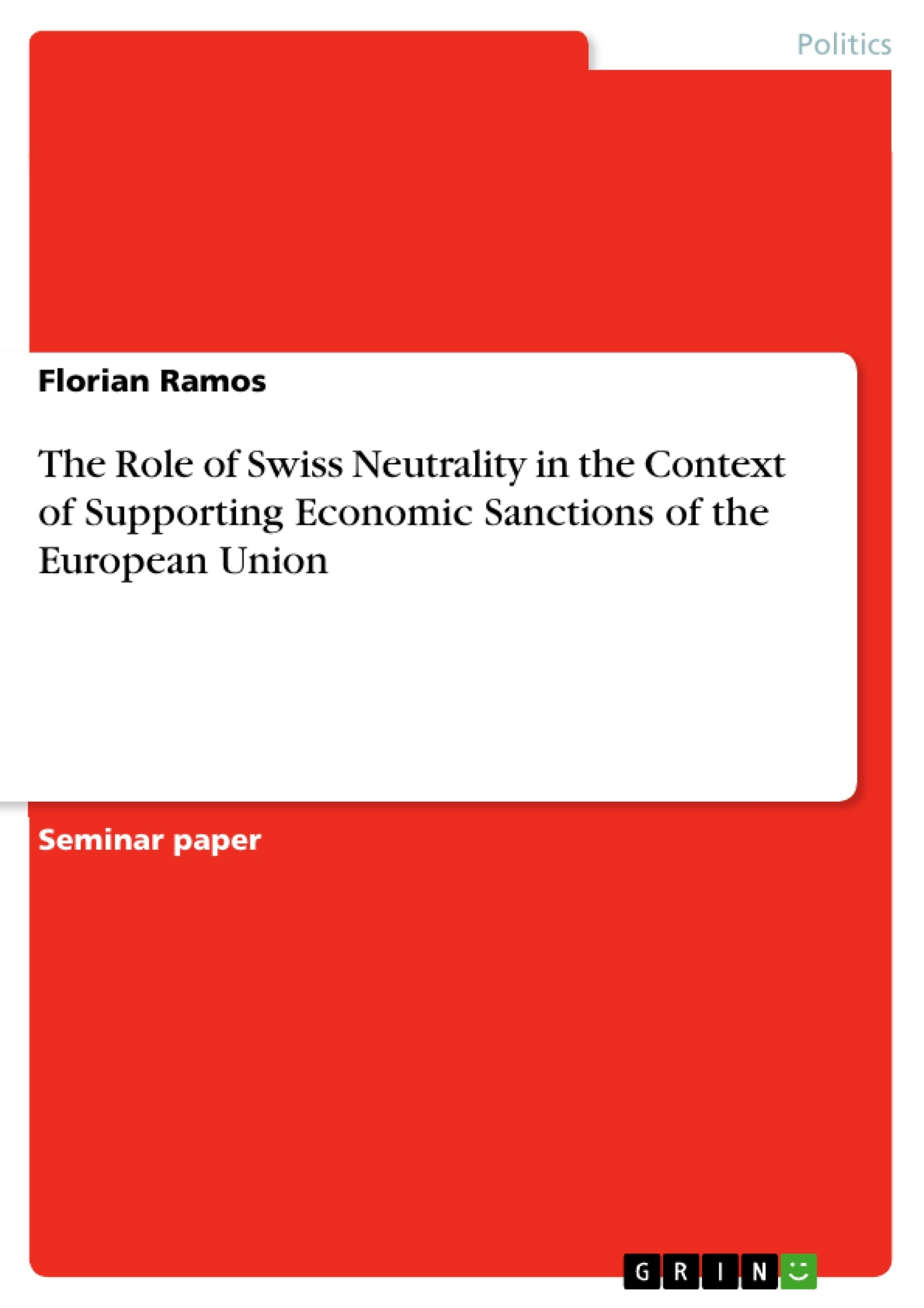This paper aims to examine the role of neutrality in Swiss foreign policy as some cases of foreign policy behaviour raises questions left to be answered. Focus is given on EU-foreign policy decisions concerning economic sanctions. The role of neutrality in this particular context would suggest not to follow EU sanctions since the country neither is a member of the Euro-pean Union, nor of the European Economic Area (EEA). Switzerland, furthermore, is not bound by international law to join economic sanctions of the EU. Yet, the country’s interest involves a broader spectrum of factors to be considered within its role of neutrality.
The main puzzle this paper further tries to solve is concerned with economic sanctions of the EU which have been implemented by the Swiss federal government. Those sanctions mostly originate from external factors that pose threats to international, regional or domestic security. Violations of international law or aggressive foreign policy behavior also represent causes to enforce sanctions as a form of protest. Economic sanctions, thus, either target a national economy as a whole and/or certain individuals, enterprises and/or institutions in order to weaken economic or political positions. Establishing trade embargos, cutting financial aid or seizing foreign assets are named as examples. This approach is often used as a non-violent means in modern foreign policy. The EU as a political union established norms to meet common foreign policy decisions in which economic sanctions are regularly enforced.
The above-mentioned EU sanctions, adopted by Switzerland, leave the following questions concerning the Swiss role of neutrality: 1. What is the definition of neutrality? 2. Does the role of neutrality implicate restrictions in joining other countries’ foreign policy stances? 3. On what grounds did Switzerland enforce economic sanctions originally established by the EU?
The Swiss foreign policy stance on neutrality has long played a crucial in the nation’s history. Since the Congress of Vienna in 1815, Swiss neutrality has officially been recognized by in-ternational law. This particular foreign policy stance may have contributed to the economic and democratic development of the nation as Switzerland stayed neutral in both World Wars. The exact role of neutrality, however, has experienced frequent adjustments as the term might not indicate a clear strategy in foreign policy behavior.
Inhaltsverzeichnis (Table of Contents)
- I. Introduction
- II. Role Theory
- III. Implications of Neutrality
- IV. Swiss Foreign Policy regarding EU Economic Sanctions.
- V. Findings
- VI. Concluding remarks.
- VII. Sources...
Zielsetzung und Themenschwerpunkte (Objectives and Key Themes)
This paper examines the role of neutrality in Swiss foreign policy, specifically focusing on EU-imposed economic sanctions. The main objective is to understand how Switzerland's neutrality aligns with its participation in EU sanctions, considering that Switzerland is neither a member of the European Union nor the European Economic Area. The paper explores the definition of neutrality, the implications of neutrality on joining other countries' foreign policy stances, and the reasons behind Switzerland's implementation of EU economic sanctions.
- The definition and application of Swiss neutrality in foreign policy.
- The role of neutrality in relation to joining other countries' foreign policy stances.
- The factors influencing Switzerland's decision to enforce EU economic sanctions.
- The use of role theory to analyze the congruence between role expectations and role behavior in Swiss neutrality.
- The impact of public opinion on Swiss foreign policy decisions concerning neutrality.
Zusammenfassung der Kapitel (Chapter Summaries)
- Introduction: Introduces the topic of Swiss neutrality and its significance in the country's history. It highlights the complexities of defining neutrality and the paper's focus on EU economic sanctions. It also presents the main research question and outlines the structure of the paper.
- Role Theory: Explores the concept of role theory and its application to foreign policy analysis. It discusses the concept of national role conceptions (NRC's) and how they relate to elite decision-making. The chapter also analyzes previous research on Swiss neutrality and its foreign policy behavior, emphasizing the importance of understanding both historical and contemporary perspectives.
- Implications of Neutrality: This chapter delves into the theoretical implications of neutrality, examining its potential constraints on joining other countries' foreign policy initiatives. It explores the various factors that could influence Switzerland's decision to participate in EU economic sanctions, considering its neutrality as a guiding principle.
- Swiss Foreign Policy regarding EU Economic Sanctions: This chapter examines specific cases of Switzerland's participation in EU economic sanctions. It analyzes the reasons behind these decisions and investigates how Swiss neutrality is interpreted and applied in practice. This section will likely incorporate empirical data on Swiss foreign policy actions.
Schlüsselwörter (Keywords)
Swiss neutrality, foreign policy analysis, role theory, national role conceptions, EU economic sanctions, international law, European Union, European Economic Area, role expectations, role behavior, congruency test, public opinion, case studies.
Frequently Asked Questions
What is the definition of Swiss neutrality?
Swiss neutrality is a foreign policy stance officially recognized by international law since 1815, aiming to keep the country out of armed conflicts and promote global stability.
Why does Switzerland support EU economic sanctions despite its neutrality?
Switzerland often aligns with EU sanctions to uphold international law, respond to security threats, and protect its own economic and political interests within Europe.
Is Switzerland legally bound to join EU sanctions?
No, as Switzerland is neither a member of the EU nor the EEA, it is not legally bound by international law to adopt EU economic sanctions.
How does Role Theory apply to Swiss foreign policy?
Role Theory analyzes how Switzerland’s national role conceptions (NRCs) influence its behavior, examining the congruence between historical expectations of neutrality and modern political actions.
What impact does public opinion have on Swiss neutrality?
Public opinion is a significant factor in Swiss democracy, often acting as a conservative force that expects the government to strictly adhere to the traditional concept of neutrality.
- Quote paper
- Florian Ramos (Author), 2020, The Role of Swiss Neutrality in the Context of Supporting Economic Sanctions of the European Union, Munich, GRIN Verlag, https://www.grin.com/document/1256293



